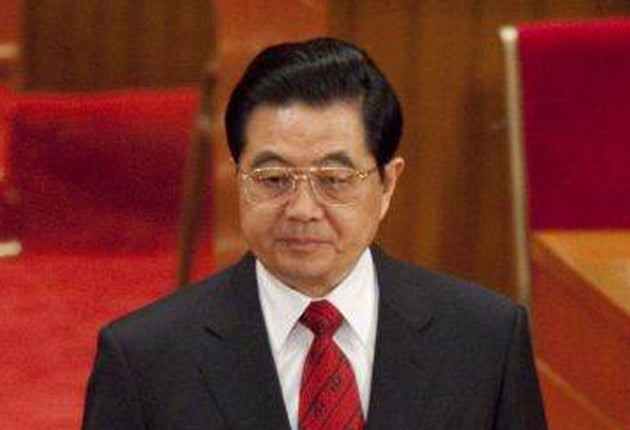Iran sends envoy to Beijing as China agrees to sanctions talks
President Hu Jintao says he will attend a UN nuclear summit later this month

Iran dispatched its top nuclear negotiator to Beijing yesterday, one day after word surfaced in New York that, after weeks of hesitation, China had agreed to sit down with other permanent members of the United Nations Security Council to consider details of a new round of sanctions against Tehran.
Diplomatic sources in New York said they expect the ambassadors of the permanent five – Britain, the US, Russia, China and France – to begin the negotiations early next week. They said China gave its acquiescence to starting the talks during a conference call this week between the political directors of all five nations. Any perceived shifts by China towards a new round of sanctions are certain to ring alarm bells in Iran, which again yesterday denounced such measures as an "ineffective weapon".
But, further encouraging Western diplomats, officials in Beijing confirmed for the first time that President Hu Jintao will attend a nuclear-security summit of world leaders to be hosted by President Barack Obama on 12-13 April. China had for weeks been coy about whether it would participate at a time when Sino-US relations have seemed especially troubled.
At a press briefing, the Chinese Foreign Ministry refused to confirm that its UN ambassador would be taking part in sanctions talks. "We will strengthen communication with other parties and engage all parties to promote a proper resolution by diplomatic means," spokesman Qin Gang told reporters, while reiterating China's distaste for international sanctions.
By sending its nuclear chief to the Chinese capital, the government in Iran will surely be hoping to divert Beijing from any track that may lead to an agreement on sanctions. The negotiator, Saeed Jalili, met with the Foreign Minister, Yang Jiechi, and doubtless underlined what is at stake for China if it sides with the US. Resource-hungry China depends on Iran for 11 per cent of its energy needs.
"We attach great importance to China's relations with Iran," Mr Yang was heard telling Mr Jalili before their meeting. China has already supported three rounds of sanctions on Iran, which continues to defy Western demands that it suspend enrichment of uranium amidst suspicion that it is seeking to develop nuclear weapons. However, its appetite for a fourth, more punitive, round has been as meagre as the American hunger for them has been intense. The US is hoping that the new sanctions will target the élite Republican Guard in Iran and its many business interests.
That China has agreed to discuss sanctions does not mean consensus will come quickly. Observers in New York doubt that sanctions will be settled before the end of April as Washington would like. But the fact that Beijing is sitting down at the table to begin earnest negotiations, coupled with the pledge to attend the nuclear security summit, was considered significant.
"The fact that China agreed to engage is a success," said Mark Fitzpatrick of the International Institute for Strategic Studies."I don't think anyone's making any bets on how long this process will take. But it looks like it's no longer a question of whether but when."
"China has agreed to sit down and begin serious negotiations here in New York... as a first step toward getting the entire UN Security Council on board with a tough sanctions regime against Iran," the US envoy to the UN, Susan Rice, told CNN.
China's hesitation about attending the nuclear summit in Washington was born of serial conflicts with the US, ranging from its anger at a US arms sale to Taiwan, an ongoing dispute over the valuation of the yuan, and the tensions surrounding the closing by Google of its Chinese-language portal because of censorship and hacking.
Join our commenting forum
Join thought-provoking conversations, follow other Independent readers and see their replies
Comments
Bookmark popover
Removed from bookmarks